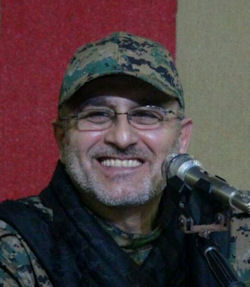Mustafa Badreddine [aka Mustafa Badr Al Din]
 On 10 May 2016, Hizballah’s military commander in Syria, Mustafa Badreddine [aka Mustafa Badr Al Din], was killed in a mysterious explosion near Damascus shortly after a meeting with his commanders. “According to preliminary information, a large explosion targeted one of our positions near Damascus international airport, killing our brother, commander Mustafa Badreddine, and wounding others,” Hezbollah said at the time. According to Hizballah, an unspecified Sunni rebel group conducted the assassination; however, no group has claimed responsibility.
On 10 May 2016, Hizballah’s military commander in Syria, Mustafa Badreddine [aka Mustafa Badr Al Din], was killed in a mysterious explosion near Damascus shortly after a meeting with his commanders. “According to preliminary information, a large explosion targeted one of our positions near Damascus international airport, killing our brother, commander Mustafa Badreddine, and wounding others,” Hezbollah said at the time. According to Hizballah, an unspecified Sunni rebel group conducted the assassination; however, no group has claimed responsibility.
Hezbollah said Badreddine had told his friends and family that he would return from Syria victorious or "a martyr." Badreddine, 55, led the Shi'ite group’s involvement in the Syrian civil war and was the highest official from the group to die since Hezbollah entered the conflict several years earlier. Badreddine had been a member of Hizballah since its inception in 1982 and took part in a majority of its operations.
According to Western media, he commanded 5,000 to 6,000 Hizballah fighters as of 2011. Badr Al Din is assessed to be responsible for Hizballah's military operations in Syria since 2011, including the movement of Hizballah fighters from Lebanon to Syria, in support of the Syrian regime. Since September 2011, strategic coordination was handled between Assad and Hizballah leader Hassan Nasrallah on a weekly basis, with Badr Al Din accompanying Nasrallah during the meetings in Damascus.
Hizballah viewed Syria and Assad as essential to preserving key land and air corridors for weapons transport from Iran to Lebanon. Western media estimate 8,000 fighters, or roughly one-quarter of Hizballah’s fighting force, is in Syria, demonstrating the group’s commitment to the civil war there.
Following the 2008 assassination of Hezbollah terrorist chief Imad Mughniyeh, Badreddine's brother-in-law, Badreddine assumed leadership of Hezbollah’s military wing and later of its militia battalion is Syria as well. Mustafa Mughniyeh is a Hizballah commander who once led Hizballah’s operations in the Golan Heights and helped organize the group’s terrorist infrastructure. He is the nephew of former Hizballah military commander Mustafa Badreddine and the son of Imad Mughniyeh, the former chief of Hizballah military and terrorist operations.
In September of 2012, the United States imposed sanctions against Hezbollah leaders, including Bedreddine, in part to expose Hezbollah’s support for the Assad regime and its role in conducting indiscriminate terrorist attacks in Syria and Lebanon. From time to time, the United States identifies certain individuals as crucial to the operation of terrorist organizations. Often these individuals are top leaders, or they help finance terrorist organizations. These are frequently people who have committed, or are deemed to pose a significant risk of committing, acts of terrorism. When such individuals are identified, the U.S. government places that person's name on the Specially Designated Nationals List, their assets within U.S. reach are immediately blocked, and they are effectively locked out of the global financial system. As a result, no U.S. citizen or company may conduct business with designated individuals.
Since 2012, Badr Al Din coordinated Hizballah military activities in Syria. Badr Al Din led Hizballah ground offensives in the Syrian town of al-Qusayr in February 2013, and in May 2013 the Free Syrian Army (FSA) confirmed that Badr Al Din was leading Hizballah's operations in al-Qusayr.
Badreddine was convicted in Kuwait for his role in bomb attacks on the US and French embassies in 1983. Badreddine escaped from prison in Kuwait after the country was invaded by Iraq under the leadership of Saddam Hussein in 1990. Badreddine was also one of four men accused in absentia of plotting the 2005 assassination of former Lebanese Prime Minister Rafik Hariri and 21 others. The trial began in 2014 at The Hague, Netherlands.
Badreddine and other suspects in the Hariri case had been dying off quickly. Other suspects who have been killed or died under mysterious circumstances in recent years include top Syrian intelligence officials Rustom Ghazaleh and Jamaa Jamaa, and Badreddine’s brother-in-law, Imad Mughniyah, who was Hezbollah’s former top military commander until he was assassinated in 2008.
“People like Badreddine and Mughniyah,” argued Nadim Shehadi, who heads the Fares Center at Tufts University’s Fletcher School of Law and Diplomacy,, “belong to the darker side of institutions and are not supposed to be well-known.... Once they are known and become too exposed,” he added, “they become a liability to their own people.”
Yaakov Amidror, a former national security adviser to Prime Minister Benjamin Netanyahu, told Israeli Army Radio that Badreddine’s passing was “good for Israel,” but added that “those [fighting] in Syria ... have a lot of [enemies other than] Israel.”
The head of the Israel Defense Forces said on 21 March 2017 that Badreddine, was killed by his own men. An Israeli military official said Israel believed the order to kill Badreddine was given by Hezbollah's leader, Hassan Nasrallah. Israeli intelligence believes Badreddine had been feuding with Iranian military commanders in Syria over the heavy losses his group had suffered on the battlefield.
|
NEWSLETTER
|
| Join the GlobalSecurity.org mailing list |
|
|
|

